人教版英语九年级Unit 3 Could you please tell me where the restrooms are单元测试卷
人教版英语九年级Unit 3 Could you please tell me where the restrooms are
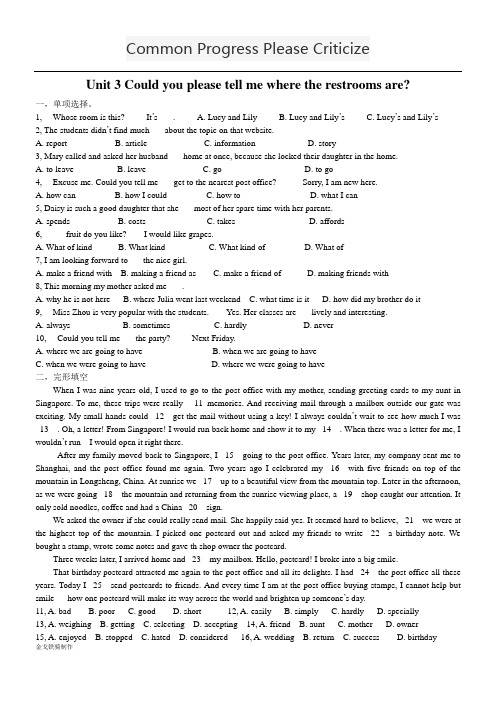
Unit 3 Could you please tell me where the restrooms are?一,单项选择。
1, ---Whose room is this? ---It’s ___. A. Lucy and Lily B. Lucy and Lily’s C. Lucy’s and Lily’s2, The students didn’t find much ___about the topic on that website.A. reportB. articleC. informationD. story3, Mary called and asked her husband ___home at once, because she locked their daughter in the home.A. to leaveB. leaveC. goD. to go4, ---Excuse me. Could you tell me ___get to the nearest post office? ---Sorry, I am new here.A. how canB. how I couldC. how toD. what I can5, Daisy is such a good daughter that she ___most of her spare time with her parents.A. spendsB. costsC. takesD. affords6, ---___fruit do you like? ---I would like grapes.A. What of kindB. What kindC. What kind ofD. What of7, I am looking forward to ___the nice girl.A. make a friend withB. making a friend asC. make a friend ofD. making friends with8, This morning my mother asked me ___.A. why he is not hereB. where Julia went last weekendC. what time is itD. how did my brother do it9, ---Miss Zhou is very popular with the students. ---Yes. Her classes are ___lively and interesting.A. alwaysB. sometimesC. hardlyD. never10, ---Could you tell me ___the party? ---Next Friday.A. where we are going to haveB. when we are going to haveC. when we were going to haveD. where we were going to have二,完形填空When I was nine years old, I used to go to the post office with my mother, sending greeting cards to my aunt in Singapore. To me, these trips were really __11_memories. And receiving mail through a mailbox outside our gate was exciting. My small hands could _12__get the mail without using a key! I always couldn’t wait to see how much I was _13__. Oh, a letter! From Singapore! I would run back home and show it to my _14__. When there was a letter for me, I wouldn’t run---I would open it right there.After my family moved back to Singapore, I _15__going to the post office. Years later, my company sent me to Shanghai, and the post office found me again. Two years ago I celebrated my _16__with five friends on top of the mountain in Longsheng, China. At sunrise we _17__up to a beautiful view from the mountain top. Later in the afternoon, as we were going _18__the mountain and returning from the sunrise viewing place, a _19__shop caught our attention. It only sold noodles, coffee and had a China _20__sign.We asked the owner if she could really send mail. She happily said yes. It seemed hard to believe, _21__we were at the highest top of the mountain. I picked one postcard out and asked my friends to write _22__a birthday note. We bought a stamp, wrote some notes and gave th shop owner the postcard.Three weeks later, I arrived home and _23__my mailbox. Hello, postcard! I broke into a big smile.That birthday postcard attracted me again to the post office and all its delights. I had _24__the post office all these years. Today I _25__send postcards to friends. And every time I am at the post office buying stamps, I cannot help but smile --- how one postcard will make its way across the world and brighten up someone’s day.11, A. bad B. poor C. good D. short 12, A. easily B. simply C. hardly D. specially13, A. weighing B. getting C. selecting D. accepting 14, A. friend B. aunt C. mother D. owner15, A. enjoyed B. stopped C. hated D. considered 16, A. wedding B. return C. success D. birthday17, A. broke B. woke C. grew D. cleaned 18, A. around B. over C. up D. down19, A. cold B. dirty C. small D. modern 20, A. Traffic B. Life C. Police D. Post21, A. because B. though C. while D. when 22, A. him B. me C. here D. them23, A. bought B. reparied C. painted D. opened 24, A. missed B. influenced C. studied D. visited 25, A. just B. seldom C. still D. never三,词汇运用26, The restroom is __________the bank. 27, I like collecting __________ (邮票).28, The policeman __________ (建议) that we should take the bus to the museum.29, There is a big supermarket near our home. It’s __________ (方便) to buy things.30, It’s __________ (不礼貌的) to talk aloud in public.31, ---Could you please ___(give) me your phone number? ---Sure.32, Tom asks us ____________________ (not play) soccer in the street.33, On __________ (they) way to work, they found a wallet.34, She becomes better at __________ (study) English.35, Lily is looking forward to __________ (work) as policewoman.四,补全对话A: Excuse me, sir. _36__B: Certainly. Go along this street. Turn left into Xingfu Street, and the museum is on your right.A: _37__B: It’s about thrity minutes.A: I see. _38__B: Yes, you can. Bus No. 103 will take you there.A: _39__B: Over there. Look! The bus is coming.A: Thank you very much!B: _40__A. I will go to the History Museum.B. You’re welcome.C.Can I take a bus?D. How long will it take me to walk there?E. That’s a pity!F. Where is the bus stop?G. Could you tell me the way to the History Museum?五,任务型阅读“Pictogram” is a compound word made from “picture” and “telegram”. Pictograms are usually simple pictures, and they are often made with letters and words. A pictogram is a symbol which represents an idea or an object through an image (图像). Also, it is a kind of communication system which must be learned but is very useful in our lives. The user must learn to see, understand and remember the different pictogram symbols. There are about 1, 400 different symbols at the prestent time.A Canadian named Subhas Maharaj came up with the idea for pictograms in the beginning of the 1980s. At first, pictograms were introduced to help people who had disabilities in speaking, reading, or writing. Pictograms are images of objects that are easy to see and create. Today, pictograms are used in many different ways. For example, there are traffic, recycling and restaurant signs, even animal symbols and so on.Pictograms are usually in white against a black background. The combination of white against a black backgroundcreates extreme contrast (对比), and this makes pictograms friendlier to users. A good example of a pictogram is the public toilet symbols for “men”and “women”just like the one on the left. Pictograms are a useful method of communication, and people can have fun as they learn each pictogram.根据短文内容回答问题41,请翻译划线部分。
人教版九年级考点整理unit-3Could-you-please-tell-me-where-the-restrooms-are
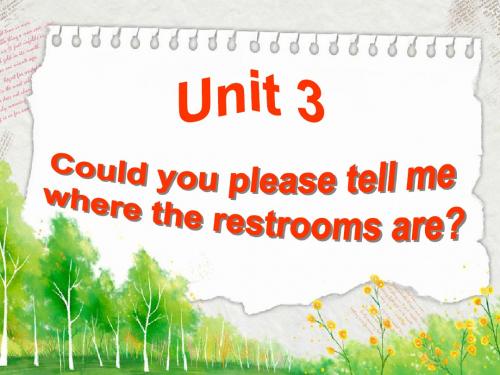
11. spend time/money (in)doing 花费时间/钱做某事 sth
spend time/money on sth
在某事上花时间/钱
12. lead in
导入
13. strange-stranger
陌生的-陌生人
14. be do sth
A. interesting something; interested B. something interesting; interesting C. something interesting; interested D. something interested; interesting
1. It looks scary. 2. You are scared. 3. hold my hand 4. try-tried try-tries 5. shout-shouting 6. It serves delicious food. 7. sign 8. a rock band 9. walk up to a staff person 10.start doing sth 11.begin to do sth
例:1.---Could you please _________the window?
---Sure, I________. A.open not, could B. not open, could
C. not opening ,can D. not open ,can
2.---Could you go shopping with me? ---__________. My father and I will go to Wuhan tomorrow.
could you please...?意为“请你。。。好吗?”,是表示请求的礼 貌用语,后接动词原形。其否定形式是在please后加not。
人教版英语九年级上册 Unit 3 Could you please tell me whe
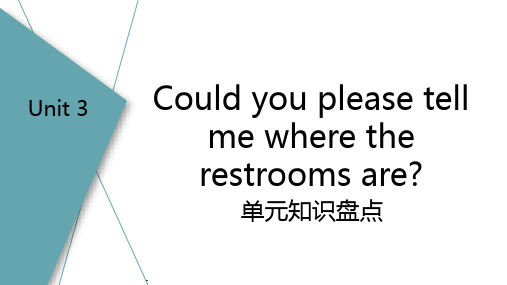
need to
than directly. However, it
spelnedadtiimneg is 9._i_m__p_o_r_t_a_n__t to 8. _in_t_o____a learn how to use the right
request. language in different
B 2b)
7. __l_o_n__g_e_r__.
They include
expressions such
as “Could you
please…?” or
“May I ask…?”
Sometimes It might seem more
we even difficult to speak politely
situations speaking to or how questions direct
well they know each because you questions.
other.
know them
well.
课文再现 Polite Usually polite
(Section questions questions are
situations. This will help
you 10._c_o_m__m__u_n__ic_a__te
better with others.
Unit 3
-
Could you please tell me where the restrooms are?
单元专题聚焦
解巧 析品 语 法
命题Байду номын сангаас报
项目
知识内容
3. Pardon me, do you know if there’s a restaurant around here? 经典句型 打扰一下,你知道这附近是否有餐厅吗?
人教版九年级英语全册 Unit 3 Could you please tell me where the restrooms are 复习题及答案

Vocabulary Nounn.洗手间;公共厕所n.邮票;印章n.书店n.明信片n.洗手间;厕所n.浴室n.仓促;急促n.管理人员;职工n.葡萄n.邮件;信件n.商场n.职员n.拐角;角落n.要求;请求n.方向;方位n.发言者n.住址n.地铁n.课程;学科_n.意大利人(语)_ n.东方Verbv.原谅_ v.仓促;急促v.建议;提议v.邮寄v.要求;请求Adjectiveadj.中心的,中央的adj.附近的adj.东方的;东部的adj.不昂贵的adj.不拥挤的adj.便利的;方便的adj.正确的;恰当的__________adj.有礼貌的___________adj.不礼貌的;粗鲁的adj.意大利人的Adverbadv.在附近;附近adv. 向东;朝东adv.礼貌地;客气地adv..通常其他prep.在......旁边pron.谁;什么人Phrase1. 向左/右转2. 在某人的左/右边3. 沿着…走4. 在第三楼5. 请再说一次6. 在去.......的路上7. 路过8. 在购物中心9. 在某些场合10. 停车11. 例如12. 为…感谢某人13. 期盼做某事…14. 第一次见到某人15 做某事很方便Structure①Pardon? Restroom? You want to rest?1 -Let's go to the Water World for a trip tomorrow,OK?-________ Where did you suggest going?()A.Pardon me.B.I don't know.C.I agree with you.D.It sounds terrible!2 -The game is too hard for me.I will certainly lose.()-You never say no before you try.__________A.forget it! B.I'm sorry.C.Come on!3 -Excuse me,can you tell me the way to the Summer Palace?-___________.You can ask the policeman over there.()A.Have a good time B.No,thanksC.Sorry,I'm new here D.Yes,of course4 ---Excuse me,is there a police station in the neighborhood?--- ______?I didn't hear you clearly.()A.Forget it B.PardonC.How come D.How do you do5 -______,where is the new Taiyuan Railway Station?-I'm sorry.I am a stranger here.()A.Hello B.No problem C.Come on D.Pardon me 6 -I'm not good at dancing,you know.-_____ It's just for fun.()A.Well done! B.No way!C.Good luck! D.No problem.7 --_______.Could you tell me where there's a good place to eat?--_________.Turn left and the restaurant is near the bank.()A.Hi; RightB.Excuse me; Of courseC.Hello; That's all rightD.Good night; Sure②Both are correct, but the first one sounds less polite.1 ---Does my question sound _______enough?---I don't think so.You can ask more _______by using"could"instead of"can".()A.politely;politely B.politely;politeC.polite;politely D.polite;polite2 The Internet has made communication much more .- I agree. For example, I can communicate with my friends on WeChat any time.()A.popular B.necessary C.important D.convenient3 One of the most______ways to get around a city is to take a taxi.()A.convenient B.serious C.difficult D.expensive4 Summer is coming.The days are getting ________.()A.long and long B.long and longerC.more and more long D.longer and longer5 A new car is much ___ than a secondhand one in the same brand (品牌) and model (型号).()A.cheap B.cheaperC.expensive D.more expensive③It is not enough to just ask a question correctly.1. 你真聪明, 解出了这道数学题。
人教版英语九年级全一册Unit 3听力原文及翻译
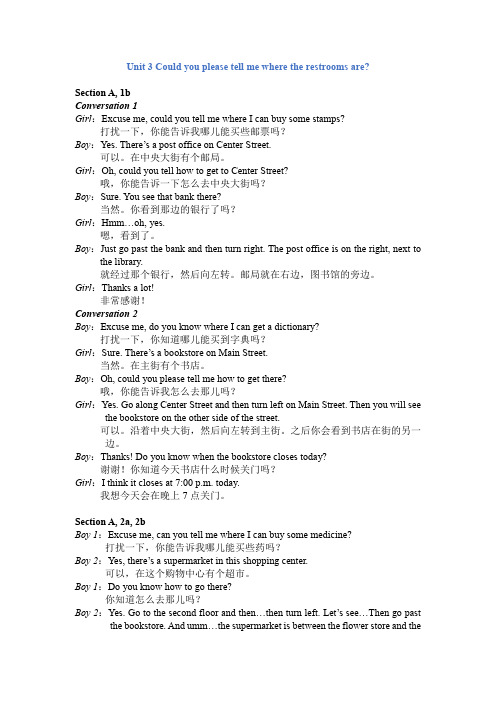
Unit 3 Could you please tell me where the restrooms are?Section A, 1bConversation 1Girl:Excuse me, could you tell me where I can buy some stamps?打扰一下,你能告诉我哪儿能买些邮票吗?Boy:Yes. There’s a post office on Center Street.可以。
在中央大街有个邮局。
Girl:Oh, could you tell how to get to Center Street?哦,你能告诉一下怎么去中央大街吗?Boy:Sure. You see that bank there?当然。
你看到那边的银行了吗?Girl:Hmm…oh, yes.嗯,看到了。
Boy:Just go past the bank and then turn right. The post office is on the right, next to the library.就经过那个银行,然后向左转。
邮局就在右边,图书馆的旁边。
Girl:Thanks a lot!非常感谢!Conversation 2Boy:Excuse me, do you know where I can get a dictionary?打扰一下,你知道哪儿能买到字典吗?Girl:Sure. There’s a bookstore on Main Street.当然。
在主街有个书店。
Boy:Oh, could you please tell me how to get there?哦,你能告诉我怎么去那儿吗?Girl:Yes. Go along Center Street and then turn left on Main Street. Then you will see the bookstore on the other side of the street.可以。
人教版九年级英语《Unit 3 Could you please tell me where the

人教版九年级英语《Unit 3 Could you please tell me where the restrooms are?》Section B(2a-2d)教学设计一. 教材分析人教版九年级英语《Unit 3 Could you please tell me where the restrooms are?》Section B(2a-2d)主要介绍了日常生活中的一些常见场所和方位表达。
通过本节课的学习,学生能够熟练运用所学的词汇和句型,询问和描述某个场所的位置。
教材以真实的生活场景为背景,让学生在实际语境中学习英语,提高他们的语言运用能力。
二. 学情分析九年级的学生已经具备了一定的英语基础,能够听、说、读、写一些基本的英语句子。
但部分学生对英语学习的兴趣不高,课堂参与度较低。
针对这一情况,教师需要在教学中注重激发学生的学习兴趣,提高他们的课堂参与度。
同时,学生在生活中接触英语的机会较少,对于一些日常生活中的英语表达还不够熟悉,因此需要在课堂上多加操练。
三. 教学目标1.知识目标:学生能够掌握 Section B(2a-2d)中出现的词汇和句型,了解日常生活中的一些常见场所和方位表达。
2.能力目标:学生能够在实际情境中运用所学的词汇和句型,询问和描述某个场所的位置。
3.情感目标:通过本节课的学习,学生能够提高对英语学习的兴趣,增强自信心。
四. 教学重难点1.重点:Section B(2a-2d)中出现的词汇和句型。
2.难点:如何运用所学的词汇和句型,在实际情境中询问和描述某个场所的位置。
五. 教学方法1.情境教学法:通过设定真实的生活场景,让学生在实际语境中学习英语。
2.交际法:鼓励学生进行小组合作,进行实境模拟,提高他们的语言运用能力。
3.任务型教学法:通过完成具体任务,让学生在实践中学习和运用英语。
六. 教学准备1.教学课件:制作与本节课内容相关的课件,以便于引导学生进行学习。
2.教学素材:准备一些与日常生活相关的图片和地图,用于创设情境。
人教版英语九全 Unit 3 Could you please tell me知识点和思维导图

Unit 3 Could you please tell me where the restrooms are?1.重点词汇restroom, stamp, postcard, bathroom, rush, staff, grape, east, small, clerk, corner, speaker, request, direction, address, course...2. 短语归纳:1.a pair of 一对,一双,一副2.between A and B在A和B之间3.on one’s / the way to 在去……的路上4.pardon me 什么,请再说一遍5.pass by 路过;经过6.look forward to 盼望;期待7.excuse me 打扰了;请原谅8.get some magazines 得到一些杂志9.get some information about 获取有关……的一些信息10.turn left/right 向左/向右转11.go past 经过;路过12.a little earlier 早一点儿13.a good place to eat 一个吃饭的好地方14.in different situation 在不同的情况下15.on time 准时;按时16.get to 到达17.have dinner 吃晚餐18.on one’s/the right在右边e on 快点;请过来20.the shopping center 购物中心21.the corner of... ……的角落/拐角处22.lead into 导入;引入3. 必背典句:1. -Excuse me, do you know where I can buy some medicine? 对不起,你知道我在哪里可以买到药吗?-Sure. There’s a supermarket down the street. 当然。
人教版英语九年级unit3 Could you please tell me where the

3. “You’ve already got well, haven’t you?” she asked.
3. Excuse me, could you tell me which is the way to the nearest hospital? 劳驾,请问去最近的医院怎么走?
4. Excuse me, would you please show me the way to the post office? 请告诉我去邮局怎么走好吗?
2. Sally needs to mail a letter.
Excuse/Pardon me, could you please tell me where the post office is? I’d like to know where I can buy some stamps. Do you know where the nearest post office is?
1. Where can I buy some grapes or other fruit?
2. How does this CD player work? 3. How do I get to the Central Library? 4. Is the Italian restaurant nearby open
1. He asked ___D_____ for the computer. A. did I pay how much B. I paid how much C. how much did I pay D. how much I paid
人教版九年级英语Unit3Couldyoupleasetellmewheretherestroomsare要点练习

初中英语学习材料madeofjingetieji九年级英语Unit 3 Could you please tell me where the restrooms are?要点练习section A1n.(美)洗手间;公共厕所[‘rest ru:m]restroom2n. 邮票;印章[st?mp]stamp3n. 书店[‘b?kst?:]bookstore4n. 明信片[‘p??stkɑ:d]postcard5interj.请再说一遍;抱歉,对不起[‘pɑ:d?n]pardon6n. 洗手间;厕所[‘w??ru:m]washroom7n. 浴室;洗手间[‘bɑ:θru:m]bathroom8adj. 快的;迅速的 adv. 快速地;迅速地[kwik]quick9v. & n. 仓促;急促[r??]rush10v. 建议;提议[s?’d?est]suggest11n. 管理人员;职工[stɑ:f]staff12n.葡萄[ɡreip]grape13adj.中心的;中央的[‘sentr?l]central14v. 邮寄;发电子邮件 n. 邮件;信件[meil]mail15adj. 东方的;东部的 adv. 向东;朝东 n. 东;东方[i:st]east16adj.迷人的;极有吸引力的[‘f?sineiti?]fascinating17adj.便利的;方便的[k?n’vi:ni?nt] convenient18n. 商场;购物中心[m?:l]mall19n. 职员[klɑ:k]clerk20n. 拐角;角落[‘k?:n?]corner21向左/右转turn left/right22起初at first23路过;经过pass by24一双鞋a pair of shoes25早一点a little earlier26到达get to27在……去……的路上on…way to …1a Where can you do the things below? Match each thing with a place in the picture. Many different answers are possible.get some moneyget some information about the townget some magazinesbuy a newspaperhave dinnerbuy some stampsget a dictionaryget a pair of shoes2d Role-play the conversation.He Wei: This is Fun Times Park — the biggest amusement park in my city!Alice: I’m excited to try the rides!He Wei: Where should we start? There’s Space World, Water World, Animal World ...Alice: Oh, could you tell me where the restrooms are first?He Wei: Pardon? Restroom? You already want to rest? But we haven’t even started yet! Alice: Oh no, I don’t mean a room for resting. I mean ... you know, a washroom or bathroom. He Wei: Hmm ... so you mean ... the toilets?Alice: Yes! Sorry, maybe the word “restroom” is not commonly used in China.He Wei: Right, we normally say “toilets” or “washrooms”. Th ey’re just over there. Alice: OK. I’ll be quick! I wonder when the park closes today.He Wei: Nine-thirty, so you don’t need to rush!3a Read the conversation and answer the questions below. 1. Why did Alice not want to go on the new ride? How did she feel after the ride?2. What is special about Uncle Bob’s restaurant? Should Alice and He Wei get there early for dinner? Why?Fun Times Park — Always a Fun Time![Alice and He Wei are in Space World]Alice: I wonder where we should go next.He Wei: How about that new ride over there?Alice: Oh ... it looks pretty scary.He Wei: Come on! I promise it’ll be fun! If you’re afraid, just shout or hold my hand.[After the ride]Alice: You were right, that was fun! I was scared at first, butshouting really did help.He Wei: See, that wasn’t so bad, right? You never know until you try something.Alice: Yes, I’m so glad I tried it. Now I know I can do it andit’s actually fun!He Wei: Do you want to go to Water World now?Alice: Sure, but I’m really hungry. Do you know where wecan get some good food quickly?He Wei: Of course! I suggest Water City Restaurant in Water World. It’s a fastfood place. It serves delicious hamburgersand hot dogs.Alice: That sounds perfect![On their way to Water City Restaurant, Alice and He Weipass by Uncle Bob’s.]Alice: Oh, look! This restaurant looks interesting. It seems arock band plays there every evening.He Wei: Maybe we can come here for dinner later. Let’s ask what time the band starts.[Alice and He Wei walk up to a staff person at the door.]He Wei: Excuse me, could you tell us when the band startsplaying this evening?Staff: Eight o’clock. It’s always busy, so come a little earlierto get a table.He Wei: OK, thanks!Grammar FocusExcuse me, do you know where I can buy some medicine?Sure. There’s a supermarket down the street.Could you please tell me how to get to the post office?Sorry, I’m not sure how to get there.Can you tell me when the band starts playing this evening?It starts at 8:00 p.m.I wonder where we should go next.You should try that new ride over there.4a Rewrite the questions to make them more polite.1. Where can I buy some grapes or other fruit?2. How does this CD player work?3. How do I get to the Central Library?4. Is the Italian restaurant nearby open on Mondays?4b What should each person ask in the following situations?1. Tim is very hungry.Could you tell me where I can get something to eat?Excuse me, can you tell me how I can get to a nearby restaurant?Pardon me, do you know if there’s a restaurant around here?2. Sally needs to mail a letter.3. Helen needs to know when the bike shop closes.4. Ben is wondering if there’s there’s a band in the shopping center. Please take notes.Section B & Self Check1adj. 有礼貌的;客气的[p?’lait]polite2adv. 礼貌地;客气地[p?’la?tl?]politely3n.讲(某种语言)的人;发言者[‘spi:k?]speaker4n. 要求;请求[ri’kwest]request5n. 选择;挑选[t??is]choicen. 方向;方位[di’rek??n]direction10adj. 正确的;恰当的[k?’rekt]correct11adj. 直接的;直率的[di’rekt]direct12pron. 谁;什么人[hu:m]whom13n. 住址;地址;通讯处[?’dres]address14adv. 忠实地;忠诚地[‘fe?θf?l?]faithfully15adj. 意大利(人)的;n. 意大利人;意大利语[?’t?li?n]Italian16两者都both…and…17更擅长become better at18期待;期望look forward to19使……想起……remind…of…20取决于depend on21凯文(男名)[‘kevin]Kevin22蒂姆(男名)[tim]Tim句型1你能告诉我……吗?Could you tell me ……?2咱们问问这乐队什么时候开始。
九年级Unit3 Could you please tell me where the重点解析

人教版英语九年级单元重点知识Unit3Could you please tell me where the restrooms are?.基础夯实【重点单词短语过关】读一读背一背grape n.葡萄central adj中心的;中央的nearby adj附近的;邻近的adv在附近;附近mail v.邮寄;发电子郎件n.邮件east adj.东方的;东部的adv向东;n.东方fascinating adj迷人的;有吸引力的expensive adj.不昂贵的uncrowded adj不拥挤的;人少的convenient adj,便利的;方便的mall n.商场;购物中心pass by路过;经过restroom n.(美)洗手间;公共厕所stamp n.邮票;印章bookstore n.书店beside prep.在……旁边;在……附近postcard n.明信片pardon v.原谅 Interj请再说一遍washroom n.洗手间;厕所bathroom n.浴室;洗手间normally adv.通常;正常情况下rush v.&n.仓促;急促suggest v.建议;提议【重点单词短语过关】读一读背一背clerk n.职员corner n.拐角;角落politely adv.礼貌地;客气地request n.要求;请求direction n.方向;方位correct adj.正确的;恰当的polite adj.有礼貌的;客气的direct adj.直接的;直率的speaker n讲(某种语言)的人;发言者whom pron.谁;什么人polite adj不礼貌的;粗鲁的address n.住址;地址;通讯处underground adj地下的;n地铁course n.课程;学科Italian adj意大利\人的;n.意大利人\语staff n.管理人员;职工a pair of一对一双一副between A and B在A和B之间on one’s/the way to 在去...的路上pardon me 对不起 ; 原谅我 ; 请原谅【重点单词短语过关】读一读背一背pass by 路过,经过look forward to 期待,盼望 ; 预期,预料excuse me 对不起,打扰一下turn left \ right 向左 \向右转go past 路过,经过on time 准时,按时get to 到达have dinner 吃晚饭 ; 吃饭 ; 吃正餐come on快点请过来the shopping center 购物中心 ; 商业中心lead into 引入 ; 导致Parking lot n.停车场【单元目标语句回顾】读一读练一练--Excuse me, could you please tell me how toget to the bookstore?--Sure, just go alongMain Street until you pass Center Street.--The bookstore is onyour right, beside the bank.--Do you know when the bookstore closes today?--It closes at 7:00 p.m. today.--Excuse me, do you know where I can get some postcards?--Sure. Go to the second floor. There’s a bookstore between the bank and the supermarket.【单元目标语句回顾】读一读练一练--Could you please tell me how to get to the post office?--Sorry, I’m not sure how to get there.--Can you tell me when the band starts playing this evening?--It starts at 8:00 p.m.--I wonder where we should go next.--You should try that new ride over there.单词和短语精讲1. Excuse me用法Excuse me是英语中常用的的客套用语,根据不同情境可理解为“请问”、“请原谅”、“不好意思,打扰一下”等。
人教版九年级 Unit 3 Could you please tell me where the restrooms are知识点教案
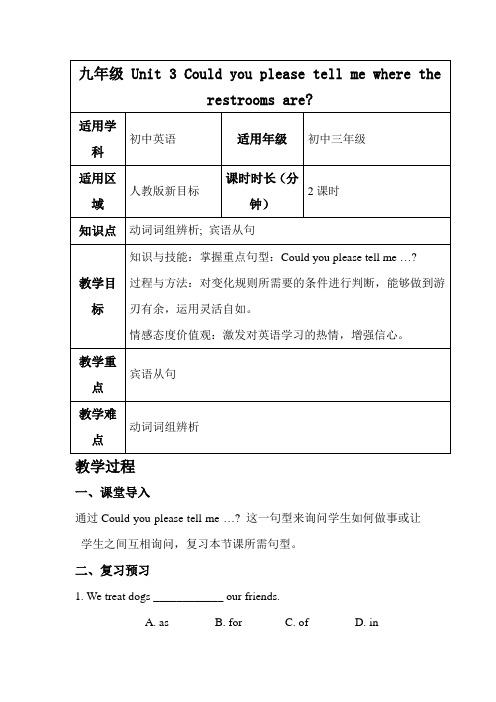
教学过程一、课堂导入通过Could you please tell me …? 这一句型来询问学生如何做事或让学生之间互相询问,复习本节课所需句型。
二、复习预习1. We treat dogs ____________ our friends.A. asB. forC. ofD. in【答案】A【解析】本题考察介词搭配,“把……当……对待”用treat sb. as/like…,故选A。
2. Mr. Mao ____________ for 35 years.A. diedB. dyingC. has been deadD. death 【答案】C【解析】本题考察现在完成时,“死”的延续式是be dead。
3. Not only Tom but also Mike __________ English very much.A. likeB. likesC. to likeD. liked【答案】B【解析】本题考察not only … but also…做主语,谓语动词采用“就近原则”。
4. We all went to the park __________ Tom. We played happily together.A. besideB. besidesC. exceptD. by【答案】B【解析】本题考察介词,根据句意:除Tom外,我们也都去了公园。
故选B。
5. ---Could you tell me __________?---Yes, there is one between the school and the post office.A. where the bookstore isB. where is the bookstoreC. how far is the bookstore isD. how far the bookstore is【答案】A【解析】本题考察宾语从句,用陈述语序,排除B和C;根据句意选A。
人教版(新目标)九年级全册Unit 3 Could you please tell me where

Unit 3 Could you please tell me where the restrooms are?-Section A 3a【学习目标】1.熟练掌握Unit 3 Section A的重点词汇,短语和句型。
2.能够理解Unit 3 Section A 3a部分短文的大概意思。
【学习过程】Step 1: 自主学习----明确目标自学文本任务一:请同学们课前上平台阅读思考本节预习案,明确本节课的学习任务和目标。
任务二:对照课本后面第一单元的单词表(158)跟读单词录音。
要求:根据录音及单词音标,首先会读单词接着边读边写记单词,注意中英文的转换,最后默写单词。
任务三:自学教材①播放音频完成课本17-18听力练习②跟19页3a音频大声朗读课文,理解文章大意,划出不理解的地方。
阅读3a,判断句子正(T)误(F)。
()1. Alice suggests going on the new ride, but He Wei thinks it looks scary.()2. According to the conversation, Alice and He Wei don't go on the new ride.()3. Alice is getting hungry and wants to get some food.()4. Alice and He Wei pass by Uncle Bob's on their way to Water City Restaurant.()5. The band starts playing at seven o'clock this evening.Step 2: 自学检测----在线测学质疑思学在线测学:请你在平台完成以下自学检测(Unit 3-Section A自学检测),提交后自己看错题及解析。
自学检测一、单词冲关1. 邮票;印章n. ________2. 在……旁边;在……附近prep. ________3. 原谅v. 请再说一遍interj. ________4. 仓促;急促v. & n. ________5. 建议;提议v.________→(派生词)建议;提议n. ___________6. 中心的;中央的adj. ________→(同根词)中心;中央n. ________7. 东方的;东部的adj. 向东;朝东adv. 东;东方n. ________二、短语冲关1. 在某人的右边____________2. 向左/右转____________3. 在……和……之间________________4. 在某人去……的路上________________5. 路过;经过____________6. 一双;一对____________7. need to do sth. ____________8. come on ____________9. get to ____________10. at that time ____________三、句型冲关1. 打扰一下,请问你能告诉我怎样去书店吗?Excuse me, could you please tell me ________ ________ ________ to the bookstore?2. ……只需沿着主街走,直到你经过中心大街。
人教版英语九年级Unit3单元知识点归纳
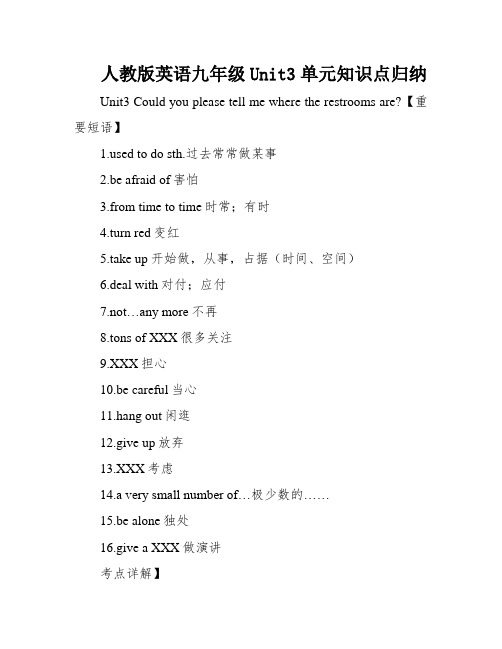
人教版英语九年级Unit3单元知识点归纳Unit3 Could you please tell me where the restrooms are?【重要短语】ed to do sth.过去常常做某事2.be afraid of害怕3.from time to time时常;有时4.turn red变红5.take up开始做,从事,占据(时间、空间)6.deal with对付;应付7.not…any more不再8.tons of XXX很多关注9.XXX担心10.be careful当心11.hang out闲逛12.give up放弃13.XXX考虑14.a very small number of…极少数的……15.be alone独处16.give a XXX做演讲考点详解】1.①问路常用的句子:Do you know where is…?Can you tell me how can I get to…?Could you tell me how to get to…?②Can/Could/Will/Would you please tell me sth.表示十分客气地询问事情③Could you tell me how to get to the park?请你告诉我怎么才能去邮局好吗?上面句子中的XXX是疑问词与动词不定式连用,用作宾语,但不是宾语从句(这一点要搞清楚,它不是宾语从句),相当于how I can get tothe park(宾语从句)I don't know how to solve the problem=I don't know how I can XXX.我不晓得若何办理这个题目Can you tell me when to leave。
=Can you tell me when I will leave?你能告诉我什么时候离开?2.一样平常社交用语:take the XXX乘电梯/自动扶梯到…楼turn left / right == take a left / right向左/右转go XXX向前直走(straight这个词经常考)3.next to中间、紧接着(常见短语)Lily is next to Ann.莉莉就在安的中间。
人教版九年级全册英语Unit3-Could you please tell me……暑假预习讲义

人教版九年级全册英语Unit3Could you please tell me where the restroomsare 暑假预习讲义基础知识一、单词1.restroom=washroom n.洗手间(公共) bathroom 洗手间(私人)toilet 厕所(英国人多用)2.stamp n.邮票(C)collect stamps收集邮票3.store n.商店(C)bookstore n.书店4.beside prep.在...旁边besides除了(包括在内)except除了(排除在外)5.pardon 原谅Pardon?=Pardon me.请再说一遍6.normally adv.通常normal adj.正常的7.rush v.n.急促,匆忙rush to do匆忙做某事in a rush匆忙8.suggest v.建议suggestion n.建议(C)suggest(sb)doing建议做某事9.staff n.全体员工(用法类似与family)10.grapes n.葡萄11.central adj.中心的center n.中心12.nearby adj./adv.附近13.mail n.v.邮件;邮寄e-mail电子邮件send an e-mail发送电子邮件14.east东west西south南north北15.fascinating adj.迷人的16.expensive=dear adj.贵的inexpensive=cheap adj.便宜的17.crowded adj.拥挤的uncrowded adj.人少的,不挤的crowd n.人群18.convenient adj.方便的It’s convenient to do方便做某事19.mall n.购物中心,商场20.corner n.角落,拐角in the corner在拐角(内部)at the corner在拐角(外部)21.polite adj.礼貌的politely adv.礼貌地impolite adj.不礼貌的impolitely adv.不礼貌地22.request v.n.要求request sb to do要求某人做某事23.direct adj.直接的;直率的director n.导演direction n.方向sense of direction方向感24.correct adj.正确的v.纠正,修改25.speaker n.发言者speak+语言26.whom pron.谁who pron.谁whose pron.谁的27.address n.住址,地址28.underground n.地铁(英) subway n.地铁(美)29.Italian n.意大利人adj.意大利的Italy n.意大利30.course n.课程Of course.=Certainly.=Sure.当然二、重点短语1.pass by 路过,经过2.parking lot停车场3.a pair of一双,一副4.on the right在右边5.turn left左转6.start with以...开始7.look scary看起来吓人8.not...until直到...才9.at that time在那时10.be busy doing忙于做某事be busy with忙于某事11.For example,例如12.,such as例如13.spend时间、金钱doing14.lead into导入15.look forward to doing期待做某事16.on time准时17.in time及时18.in different situations在不同情况下19.a good place to eat一个吃饭的好地方20.get to=arrive at/in=reach抵达21.mean to do打算,企图22.mean doing意味着23.kind of=a little有点三、重点句型及语法1.if主将从现、主情从现、主祈从现If you’re scared,shout or hold my hand.If you study hard,you can get good grades. If it is sunny,we will go out.2.助动词do,does,did肯定句中表强调Shouting did help.喊叫确实有帮助I do love you.我真的喜欢你3.委婉语气Could you please help me?肯定回答:Sure./Certainly./Of course./No problem./Yes,please.否定回答:Sorry,I can’t./I’d love to,but...否定句:Could you please not smoke here?4.四大花费人pay钱for物:I paid ten dollars for it.人spend时间、金钱on sth/(in)doing sth:I spent ten dollars on it.=I spent ten dollars(in)buying it.物cost人钱:The pen cost me ten dollars.take:It took him an hour to get there.5.宾语从句的判断动词、介词、形容词后面加的句子都是宾语从句,有类动词后面加两个宾语,把指物的宾语变成句子也是宾语从句,容易跟定语从句混淆,下面是常见的可以加双宾语的动词:tell sb sth=tell sth to sbshow sb sth=show sth to sbgive sb sth=give sth to sbsend sb sth=send sth to sbpass sb sth=pass sth to sbbuy sb sth=buy sth for sb基础过关一、单选题1. I often doubt ______ he says.A. whether to believe whatB. whether should I believe whatC. if to believe whatD. whether to believe that2. Can you explain ?A. why should children do choresB. why children should do choresC. what should children do choresD. what children should do chores3. —Did Alice tell you ______ to get to the station?—Yes, she said we would meet there at ten.A. howB. whatC. whenD. where4. —Could you please tell me ______ I can buy some stamps?—Yes. There is a post office on the Centre Street.A. whyB. whereC. whenD. how5. —Iˈll have a five-day holiday. But I donˈt know ______.—How about Beijing?A. what to doB. where to goC. when to goD. how to go6. Do you know ________ in the future?A. what will the life be likeB. what the life is likeC. what is the life likeD. what the life will be like7. —Do you know to see the Beijing Opera?—Yes, you can go to Mei Lanfang Theatre.A. when shall we goB. when we shall goC. where can we goD. where we can go8. Would you please tell me ________?A. when did he come homeB. where would he play footballC. when had he seen the filmD. why he didn't watch the game9. —Can you tell me ________? —At the end of July.A. how often he heard from his pen palB. how soon he will be hereC. that he went on vacationD. when you will start your vacation10. Do you know ________?A. where does water come fromB. how do we make electricityC. who is looking foolish nowD. why is there a grin on his face二、完形填空Recently, a woman (1) Angela was leaving a playground with her little son (2) a man caught her with a knife and wanted to rob (抢劫) her. But suddenly a dog (3) out. He saw the dangerous situation and ran to help Angela and her young son."I didn't think the dog would fight against the man, (4) he went at him and barked at the man. It was clear (5) he was trying to help me," Angela said. "I didn't know (6) this man wanted to do, but it is true the dog saved my life."The bad man ran away, (7) Angela went to her car. When she got in her car and tried to drive off, she wassurprised (8) the dog jumped into her backseat, too. He wanted to come home (9) them, it seemed.The dog had (10) tags (标签). Angela believed him to be simply lost (11) his good health. To be safe, Angela took him on the safe side. Angela took him to a shelter (收容所) (12) his owner could easily find him—but nobody comes to pick up the dog, (13) he's coming home with her.For Angela, it doesn't matter (14) the dog came from, just that he was there when she needed him most. She's already named him Angel. To her and her son, that's exactly (15) he is.1. A. names B. name C. naming D. named2. A. that B. when C. how D. where3. A. run B. runs C. ran D. is running4. A. so B. but C. unless D. because5. A. that B. which C. whom D. whose6. A. how B. what C. who D. where7. A. but B. so C. for D. before8. A. see B. seeing C. to see D. saw9. A. for B. to C. on D. with10. A. not B. none C. no one D. no11. A. because B. off C. because of D. of12. A. so that B. such that C. so D. that13. A. if B. so C. as D. with14. A. whose B. where C. who D. what15. A. who B. what C. where D. whose三、阅读理解AI used to live in an area where the public transportation(公共交通) was not very good. If I came back home after 7 pm, I would have to wait in line for about an hour before I was able to take public transport or taxis. Because the line would be so long, there were many special taxis that would come by and offer to take people home without waiting so long, but the price was so high that not everyone could afford it every day.One day, I worked overtime. When my work was done, it was 9 pm. There was no public transport and I felt so tired that I wanted to return home quickly to have a good sleep. So I took one of this kind of taxis. When I arrived, the driver didnˈt ask me to pay and he just did it as an act of kindness. He said that he didnˈt ask those who took his taxi after 9 pm to pay. His father had done it before and he found it such a nice thing to do that he decided to continue it himself.I felt so touched by his words. There were no words for me to express how thankful I was. He made me feel so good during the following days because of that free ride.I decided to do acts of kindness myself which might have the same influence on me as this one had.1.Which was not the reason why the writer took this special taxi?A. He didn't have to wait long.B. He spent less on the ride.C. He was really tired.D. He wanted to get home earlier2.What can we know about the driver's father?A. He lived a poor life.B. He used to be a taxi driver.C. He often worked overtime.D. He always helped the poor.3.According to the passage the writer will ________ after being helped.A. stick to his dreamsB. treasure what he hasC. face difficulties bravelyD. do good things for others4.How did the writer feel when he wrote the text?A. Sorry.B. Shy.C. Thankful.D. Worried.5.What's the best title for the text?A. A Lesson from a Wrong ChoiceB. Don't Trust StrangersC. It's Better to Give than to ReceiveD. An Unexpected Free RideBThe self-driving tour has become a good choice to spend the holidays for people who are tired of traditional ways. They choose to have a good time traveling by car.About twenty years ago, most people in our country went on a trip in a tour group. It was an easy way for tourists to visit several places, because the travel agency(旅行社)could arrange everything for them, including hotels and plane tickets. There was a bus that could take them to different places during the trip.With the development of our country, people's lives become better and better. Most families at least have one car. People also find that they used to spend more time shopping than looking around because of the travel agency's arrangement. They often stayed in one place for a short time and had a quick look. Now more and more people choose self-driving tours. They can go wherever they like and plan their trips freely.However, there are also some disadvantages of this new traveling way. People have to pay more because it's not easy to book the cheapest tickets or hotels by themselves. And there are many kinds of cost on the road. If they meet some troubles, they have to deal with it themselves. Besides, driving for a long time can be a tiring thing. It's good for people to have at least two drivers in a car, so that they can drive in turn.6.If you want to go on a holiday in a special way, you can ______ according to the text.A. book plane tickets by yourselfB. travel to one place by trainC. go on a tour by carD. join a travel group7.What does the underlined word "arrange" mean?A. celebrateB. cancelC. shareD. plan8.Why do people travel in a tour group?A. Most of them have private cars.B. They can have more time to go shopping.C. They can take a bus to travel among places during a trip.D. They can enjoy themselves visiting many places of interest in a day.9.If you want to have a self-driving tour, itˈs not easy to ________.A. plan the time of your tripB. book hotels with the lowest priceC. go anywhere you like and stay longerD. decide where to live and have dinner10.What is the text mainly about?A. How people spend their holidays.B. The advantages of self-driving tours.C. Why people like traveling by car.D. Two different ways of traveling.四、阅读填空What food do you eat every day? Do you eat (1) (health) food? The US photographer (摄影师) Greg Segal asks students what they eat every week. Then, he (2) (take) photos of the students and their food. Segal wants to use them to ask students (3) (eat) healthy food.Colorful fruit and vegetables help (4) (we) keep healthy. Green is good for our (5) (eye). And it gives us strong bones and teeth. Blue and purple help us remember things (6) (good). They are good for our eyes, (7) . Red gives us healthy hearts. Yellow and orange give us (8) (many) vitamin C.For packaged(包装的) food, look at the ingredients(成分) first. Don't eat food (9) too many unhealthy ingredients. The winter vacation(寒假) is coming. You can write down or take photos of your food for one week. That way, you can know (10) you eat clearly.五、句型转换1.Peter doesn't know. Where does the electricity come from? (改为宾语从句)Peter doesn't know where from.2.What are they doing? Tom didn't tell me. (改为宾语从句)Tom didn't tell me they doing.3.Could you tell me his address? (同义句转换)Could you tell me ?4."Where can you buy so many grapes?" I asked Alice.I asked Alice she buy so many grapes.5.Ruby asked Jack, "What are you looking for?"Ruby asked Jack ________ ________ ________ ________ ________.答案一.ABCBBDDDDC二.D、B、C、B、A、B、B、C、D、D、C、A、B、B、B三.B、B、D、C、D C、D、C、B、D四.1.healthy2.takes3.to 5.eyes6.well7.too8.much9.with10.what五、electricity comeswhat werewhere he liveswhere couldwhat he was looking for。
人教版九年级英语 Unit3 Could you please tell me

What is the main purpose of the passage?
To help us communicate better with other people.
2c. Find the direct questions and polite requests.
Direct questions
Para. 3
BoUdsyua—llythpeolfietaetquureesotifopnosliatreellaonngguearg. e (longer)
Para. 4
CoItnicsluimsipoonr—tantthteoilmeapronrhtaonwcetoouf suesitnhge trhigehrtight language in dliaffnegrueangtesituations.
1. Where are the restrooms?
2. When is the school trip?
3. Where’s the post office?
Polite requests
1. Could you please tell me where the restrooms are?
2. Excuse me, Mr. West. Do you know when the school trip is?
2b. Read the article and underline the topic sentence for each paragraph.
Usually polite questions are longer. They include expressions such as “Could you please …?” or “May I ask …?” It sounds more polite to say “Peter, could you please tell me your e-mail address?” than “Peter, tell me your e-mail address”. Sometimes we even need to spend time leading into a request. For example, we might first say to a stranger, “Excuse me, I wonder if you can help me.” or “ I’m sorry to trouble you, but …” before asking for help.
初三英语上册(人教新目标)Unit-3-Could-you-please-tell-me-where-the-restrooms-are-知识点总结
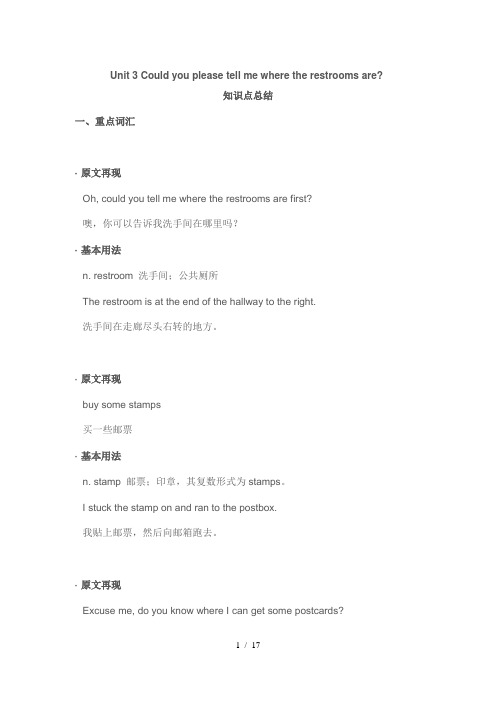
Unit 3 Could you please tell me where the restrooms are?知识点总结一、重点词汇·原文再现Oh, could you tell me where the restrooms are first?噢,你可以告诉我洗手间在哪里吗?·基本用法n. restroom 洗手间;公共厕所The restroom is at the end of the hallway to the right.洗手间在走廊尽头右转的地方。
·原文再现buy some stamps买一些邮票·基本用法n. stamp 邮票;印章,其复数形式为stamps。
I stuck the stamp on and ran to the postbox.我贴上邮票,然后向邮箱跑去。
·原文再现Excuse me, do you know where I can get some postcards?请问,你知道我从哪里可以得到一些明信片吗?·基本用法n. postcard 明信片It was very considerate of you to send me a postcard. 你想得真周到,寄给我明信片。
·原文再现Pardon?请再说一遍。
·基本用法interj. 请再说一遍;抱歉,对不起。
---Will you let me open it?我能打开它吗?---Pardon?请再说一遍?----Can I open it?我能打开它吗?·原文再现I mean … you know, a washroom or bathroom.我的意思是……你知道,洗手间。
·基本用法n. bathroom 浴室;洗手间She has gone in to use the bathroom.她去洗手间了。
- 1、下载文档前请自行甄别文档内容的完整性,平台不提供额外的编辑、内容补充、找答案等附加服务。
- 2、"仅部分预览"的文档,不可在线预览部分如存在完整性等问题,可反馈申请退款(可完整预览的文档不适用该条件!)。
- 3、如文档侵犯您的权益,请联系客服反馈,我们会尽快为您处理(人工客服工作时间:9:00-18:30)。
英语试题 第1页(共8页) 英语试题 第2页(共8页)九年级英语人教九(上)Unit 3单元检测(考试时间:80分钟 试卷满分:100分)注意事项:1. 本试卷共8页,六个大题,满分100分,考试时间80分钟。
2. 本试卷上不要答题,请按答题卡上注意事项的要求直接把答案填写在答题卡上。
答在试卷上的答案无效。
一、单项选择(15小题,每小题1分,共15分)从A 、B 、C 、D 四个选项中选出一个最佳答案。
1. ________________ is the girl ________________ our English teacher? A. Who ;besideB. Whom ;besidesC. Where ;besideD. Where ;besides2. —Could you tell me where the supermarket is?—Sure. The supermarket is ________________ the bookstore ________________ the post office. You can find it easily.A. between ;andB. both ;andC. either ;orD. neither ;nor3. I have to say it is not ________________ for me to see you now, because I am very busy with my work. A. impoliteB. safeC. inexpensiveD. convenient4. —Will you carry the box for me, please? —Sure, ________________. A. no goodB. no problemC. no ideaD. no way5. It ’s necessary for us ________________ English well. A. to learnB. learningC. learnD. learns6. This question sounds ________________ than that one. A. many more politeB. much more politeC. many more politelyD. much more politely7. —Could you tell me ________________?—Talking about festivals. A. how they are playing B. what they are doing C. where they are goingD. why they are practicing8. —Excuse me. Could you tell me the way ________________ the nearest supermarket? —Go down the street and turn left. Then you ’ll see it. A. toB. ofC. inD. at9. —How do you like the movie you watched last night?—It was so ________________ and made me ________________.A. frightening ;frighteningB. frightening ;frightenedC. frightened ;frighteningD. frightened ;frightened10. ________________, the Internet was only used by the government. But now it ’s widely used in every field. A. As usual B. At first C. After allD. So far11. Li Ming has no ________________ but to leave. A. choiceB. supportC. mixtureD. honour12. —When shall we go?—It hasn ’t been decided yet. It ________________ the weather. A. begins with B. leads to C. depends onD. thinks of13. —Daddy, can you come home for supper with us this weekend? —________________, but I might be a little late. A. I ’m busy B. Hard to say C. Of courseD. Never mind14. Tom knew nothing ________________ his friend told him. A. becauseB. untilC. sinceD. if15. —Could you please tell me ________________? —About twenty minutes ago. A. when did you see this kidB. where did you see this kidC. when you saw this kidD. where you saw this kid二、完形填空(10小题,每小题1分,共10分)先通读短文,掌握其大意,然后从A 、B 、C 、D 四个选项中选出一个可以填入相应空白处的最佳答案。
英语试题第3页(共8页)英语试题第4页(共8页)I’m a 14-year old middle school student from Shandong. I enjoy traveling and I have been to many places. But Kunyu Mountain was the most unforgettable place I’ve 16 been to.Kunyu Mountain is a place of 17 near my hometown. My dad and I went to 18 it in the early summer five years ago. At first I thought the top was so 19 that I could never reach it. When I 20 , I always saw that top surrounded by many white clouds. The view was beautiful, 21 I was not interested in looking at it. I felt very tired because of the 3-hour walk and I had a 22 in my legs. However, I said to myself that I couldn’t give up because it was my dream to climb to the top.It was cold and the wind was brushing my face strongly. I succeeded in 23 the top without the help of my dad. Seeing the mountains with large rocks around me, I smiled. I enjoyed my 24 although I fall over the stones several times. And I have fallen in love with the beautiful view of nature since then.In our lives, the top is our dream. The climbing is difficult but worth your hard work. Just prepare more so that you can 25 get to the top. Whatever the result is, at least I have tried my best. I believe I can make my dream come true.16. A. ever B. never C. always D. already17. A. scene B. travel C. interest D. trip18. A. climb B. run C. ride D. rush19. A. smooth B. huge C. magic D. high20. A. looked down B. looked up C. looked out D. looked back21. A. and B. but C. so D. because22. A. pain B. hurt C. rest D. shake23. A. arriving B. getting C. reaching D. going24. A. result B. success C. gift D. luck25. A. completely B. quickly C. finally D. carefully三、阅读理解(20小题,每小题2分,共40分)阅读下面四篇语言材料,然后按文后要求做题。
ASome people have a very poor sense of direction. Unluckily, I am one of them. I have visited a place many times but I may still get lost there the next time.When I was a little girl, I never dared(敢于) to ask strangers the way. And so I used to walk around in circles and hope that by chance I would get to the place I was going to.Now, I am no longer too shy to ask people for directions, but I often receive helpless or even wrong information. So I try to avoid giving people wrong directions. If anyone ever asks me the way somewhere, I would say, "Sorry, I am a stranger here."Once on my way to work I was stopped by a man. He asked me if I could tell him the way to the Friendship Building. I gave him my usual reply. But just as I walked on only a few steps. I realized that he had asked the way to my office building. However, I had no time to turn back and look for him. I was rushing to meet with someone at my office and I didn’t want to keep him waiting.When I just got to my office, the secretary(秘书) showed in the man who had asked me for directions. Imagine how embarrassed I was and how surprised he was when we saw each other at the first sight.根据材料内容选择最佳答案。
